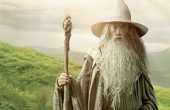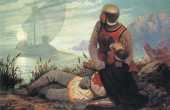Stephen Matthias
Writer, swimmer, tea connoisseur
Contributor I
- Lurker
- Sharp-Eyed Citizen
- Article of the Month
- ?
- Articles
2 - Featured
2 - Comments
72
- Ext. Comments
8 - Processed
10 - Revisions
9
- Topics
5 - Topics Taken
0 - Notes
4
- Topics Proc.
5 - Topics Rev.
2
- Points
690 - Rank
176 - Score
391
Latest Articles
Latest Topics
Content-Creation vs. Art?As we've seen in 'Star Wars' and, more recently, 'The Lord of the Rings', television adaptations are entering an age in which a story and its characters can be explored ad nauseam without the input of the original author/creator (whether the creator died or sold rights, or whether copyright expired). We can conceivably imagine, then, 'Star Wars' films coming out years, even decades from now, even though the mind of George Lucas is no longer involved. I guess I have a number of questions:
|
The Popularity of Ruffians and OutlawsIn both film and literature, there is an immortalization and sometimes a glorification of those who go against the law. Whether it be Michael Corleone and his mafia empire, Robin Hood and his crusade of justice against the Sheriff of Nottingham, or William Wallace in his brutal guerilla war against the English. What makes these seemingly heroic characters, albeit felonious, so popular?
|
The Rise of the Antihero: A Modern FascinationOver the last few decades, television has seen a rise in antiheroes as the main characters. Whether it be Tony Soprano in "The Sopranos," Walter White in "Breaking Bad," or Nucky Thompson in "Boardwalk Empire," it appears that many of the most talked-about television series star protagonists whom the audience could find just as repulsive as they are relatable. Are a character's flaws the measure of how relatable he/she will be to the viewer?
|
Things Carnal and Bloody: The Appeal of the "Lower Pleasures"It seems that in many television series produced for mature audiences, there is an abundance of explicitness, whether it be in gory violence or raunchy romance. Especially in HBO shows such as Game of Thrones, True Detective, and Rome, all of these rather "carnal" appeals almost dominate the shows. It is almost as if these themes are what define these series. What is it about such adult themes that makes these shows popular? Do they take away from the show's overall message? Are there shows that don't even seem to have a message beyond explicitness for entertainment?
|
The Popularity of Prose and Poetry: A DisparityThere is great unbalance between the popularity of works of prose and works of poetry in today's world. Everyone and their mother has read a novel or two, and you might even hear them recommend one. Poetry, on the other hand, seems to be something hidden from mainstream conversation and even recognition. I can go on naming celebrated contemporary authors and novelists, while the only poet I can think of as being worthy of "celebrity" status is Billy Collins. That is not to say that there are not skilled or renowned poets today, but it seems that neither they nor their work are nearly as recognized. Why might this be?
|
Latest Comments
| Lovecraft & Racism | |
What a fascinating article! I hope we can expect more to come! | Painters Who Challenged the Conventional Female Nude |
Yes, and the reason it is used that way in Beowulf is because the poem is heavily influenced by the Norse. It does, after all, take place in Scandinavia. | The Origins of Middle-Earth: Gods, Poems, and Dragons |
I don’t think he had just one figure in mind when he created Gandalf, but several. https://en.wikipedia.org/wiki/Gandalf#Concept_and_creation “In a letter of 1946 Tolkien stated that he thought of Gandalf as an “Odinic wanderer”.[23] Other commentators have also compared Gandalf to the Norse god Odin in his “Wanderer” guise—an old man with one eye, a long white beard, a wide brimmed hat, and a staff.[24]” | The Origins of Middle-Earth: Gods, Poems, and Dragons |
Thank you! If you get a chance to read the full poem, I recommend it! | The Origins of Middle-Earth: Gods, Poems, and Dragons |
I am glad you thought so! Thank you! | The Origins of Middle-Earth: Gods, Poems, and Dragons |
Thank you! I am glad it pleased! | The Origins of Middle-Earth: Gods, Poems, and Dragons |
I agree. | The Origins of Middle-Earth: Gods, Poems, and Dragons |


How exactly is racism “fully justified” in his works?